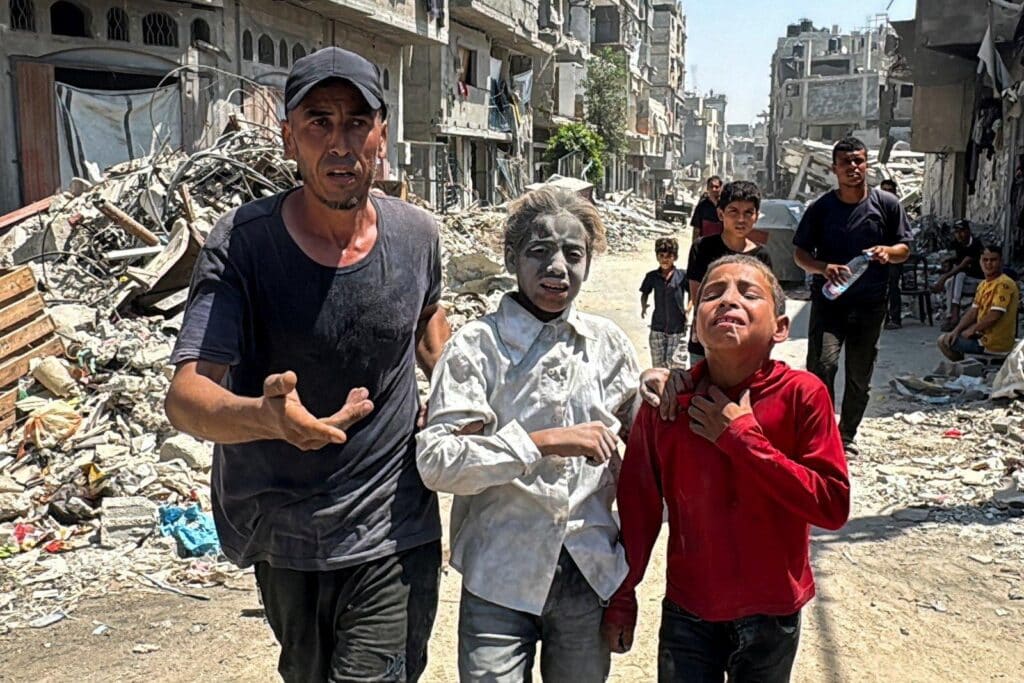(OSV News) — With a ceasefire between Israel and Lebanon barely holding, as both sides accuse each other of violations, hopes for even a fragile peace seem impossible for those living and aiding people in Gaza.
According to a Dec. 3 report by the United Nations Office for the Coordination of Humanitarian Affairs, an estimated 44,502 Palestinians have died since Israel declared war on Hamas Oct. 7, 2023.
The report’s figures, which were provided by the Ministry of Health in Gaza, stated that of those casualties, 16,735 are men; 13,319 are children; 7,216 are women; and 3,447 are elderly.
Furthermore, the report showed that throughout the year, humanitarian organizations have been increasingly impeded or denied requests to provide aid, or have even withdrawn their requests due to logistical, operational or security reasons.
April proved to be among the deadliest for aid workers when an Israeli missile strike killed seven aid workers of World Central Kitchen, a humanitarian organization that delivers food in war-torn countries.
Founded by celebrity Catholic chef José Andrés, the World Central Kitchen, or WCK, said the workers were leaving the Deir al-Balah warehouse after delivering 100 tons of humanitarian food in “two armored cars branded with the WCK logo” when the attack happened.

The following month, a brigade of Israeli tanks seized control of Rafah, a southern Gaza Strip town bordering Egypt in what Israeli Prime Minister Benjamin Netanyahu framed as a strategic step in dismantling Hamas’ government and military capability.
However, humanitarian organizations in the region said the IDF blocked humanitarian convoys from entering, despite food shortages for nearly 2 million people in what the United Nations World Food Program deemed a “full-blown famine.”
In June, Israelis rejoiced at the news that four hostages — kidnapped at the Nova music festival during the Oct. 7 Hamas attack — were rescued by IDF soldiers during an operation in Gaza.
Jubilation turns to horror
However, jubilation turned to horror in the aftermath when Gaza’s Ministry of Health reported that an estimated 274 people, including 64 children and 57 women, were killed and an estimated 700 wounded.
Eyewitnesses told The Associated Press that during the June 8 raid, Israeli fighter jets bombed areas of the Nuseirat refugee camp. The IDF justified its use of force, saying its troops were under fire. The Israeli military also disputed the health ministry’s casualty numbers, claiming that “less than 100 people” were killed.
The escalating death toll of innocent civilians in the conflict prompted U.N. Secretary-General António Guterres to declare that the current course of the war was “unsustainable” and that “nothing can justify the collective punishment of the Palestinian people.”
Guterres’ Sept. 24 speech came four days after a video was made public of Israeli soldiers throwing the bodies of dead Palestinians off the roof of a building, an act that would constitute a violation of international law.
Denouncing alleged human rights violations committed by governments at war, Guterres said that “the level of impunity in the world is politically indefensible and morally intolerable.”
The continuous reports throughout the year regarding human rights violations against Palestinians by the Israeli government prompted the International Criminal Court to issue an arrest warrant Nov. 21 for Netanyahu and former Israeli Defense Minister Yoav Gallant.
In a statement announcing the arrest warrants, the ICC said Netanyahu and Gallant “bear criminal responsibility” for several war crimes, including “the use of starvation as a method of warfare,” and “the crimes against humanity of murder, persecution, and other inhumane acts.”
For Anton Asfar, secretary general of Caritas Jerusalem, the past year has been one of hardship and traumatic loss, not only for the people in Gaza and the West Bank, but also for his colleagues.

During the war’s first month, on Oct. 19, 2023, an Israeli airstrike on the St. Porphyrios Greek Orthodox Church campus in Gaza killed 17 people, including 26-year-old Viola, a Caritas worker, who died alongside her husband and their infant daughter.
Speaking to OSV News via video call Dec. 6, Asfar remembers vividly when he and his colleagues found out Viola was killed.
“On Oct. 7 evening, I launched a ‘buddy-to-buddy system.’ So our colleagues in the West Bank and East Jerusalem would have continuous calls on a daily basis with their colleagues in Gaza to check on them. Imagine an HR officer calling a colleague to see if he or she is alive or not!” he said.
“One of my colleagues, who is operating in Bethlehem, was in contact with Viola to check on her and everything was fine. Then all of sudden, the next day, she found out that the bombardment happened and Viola was killed. So even in the West Bank, the staff was traumatized by the situation and the challenges our colleagues are having.”
Offering support after heartbreaking losses
Asfar said Caritas launched psychological support sessions not only for staff in the West Bank and East Jerusalem who were left traumatized not only by Viola’s death, but also the deaths of family members and the displacement of relatives in the aftermath of the war.
“I myself, as leader of the organization,” attended the sessions, because I knew Viola in person. I met her on the field and saw how compassionate she was in delivering services in the rural areas of Gaza and how she loved her job.
Asfar told OSV News that Viola embodied the Caritas motto of “putting love into action.”
“She was loyal to the mission of Caritas Jerusalem. Viola was an example of a compassionate worker who put effort in serving the community with love,” he said.
Like other humanitarian organizations in the region, Caritas Jerusalem continue to face not only the insurmountable task of trying to help in Gaza, but to also protect its own staff.
In the moments leading up to the Israeli military’s takeover of the Rafah crossing in May, Asfar said his staff, many of whom were displaced in the camp there, were mobilizing to evacuate medical personnel and flee further north before the invasion.
“We try to protect our staff but unfortunately, it’s not in our hands because, although there is what is called a humanitarian zone, there is no safe place in Gaza at all. So, many of our staff have been injured,” he explained.

Asfar noted that Caritas Jerusalem, as well as other nongovernmental organizations, face increasing difficulties in providing aid and have been impeded by Israeli authorities at times. For example, he said, before the war, “our supply trucks entering Gaza, almost on average, were about 500 trucks daily.”
“After Oct. 7, it diminished to 35-37 trucks a day, which is nothing. It’s a drop in the ocean. There was pressure by the Americans and it increased — and I say ironically — ‘significantly’ to 65 trucks. So, it’s nothing,” he said.
Palestinians in the West Bank, whose livelihood depends on tourism, especially in Bethlehem, are also suffering due to the war. With hardly any visitors, many have lost their sole source of income and rely on Caritas for aid.
While prayers, expressions of solidarity and even financial help is appreciated, Asfar told OSV News that Catholics have a responsibility to pressure their own governments make an “ethical commitment to stop” the war and to put pressure “on the Palestinians and Israelis, but especially the Israelis, to have a just and equitable resolution for this long years of conflict.”
“Our mission is to promote justice (as a means) for peace so that peace can be brought to this land. And we believe that the King of Peace, one day, will come and bring this peace. So, it’s their call, it’s their responsibility,” he said.








